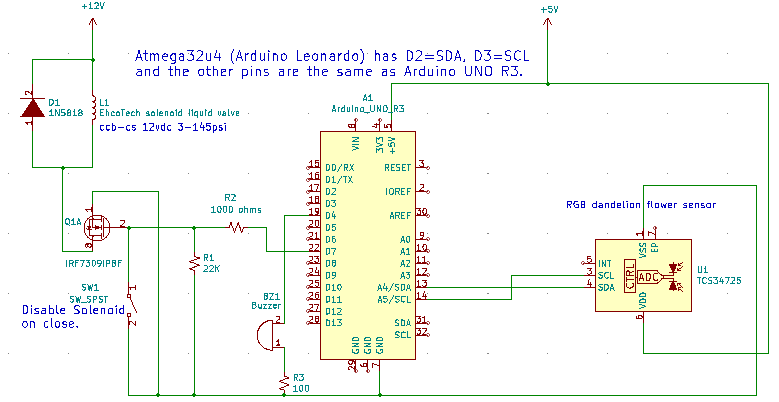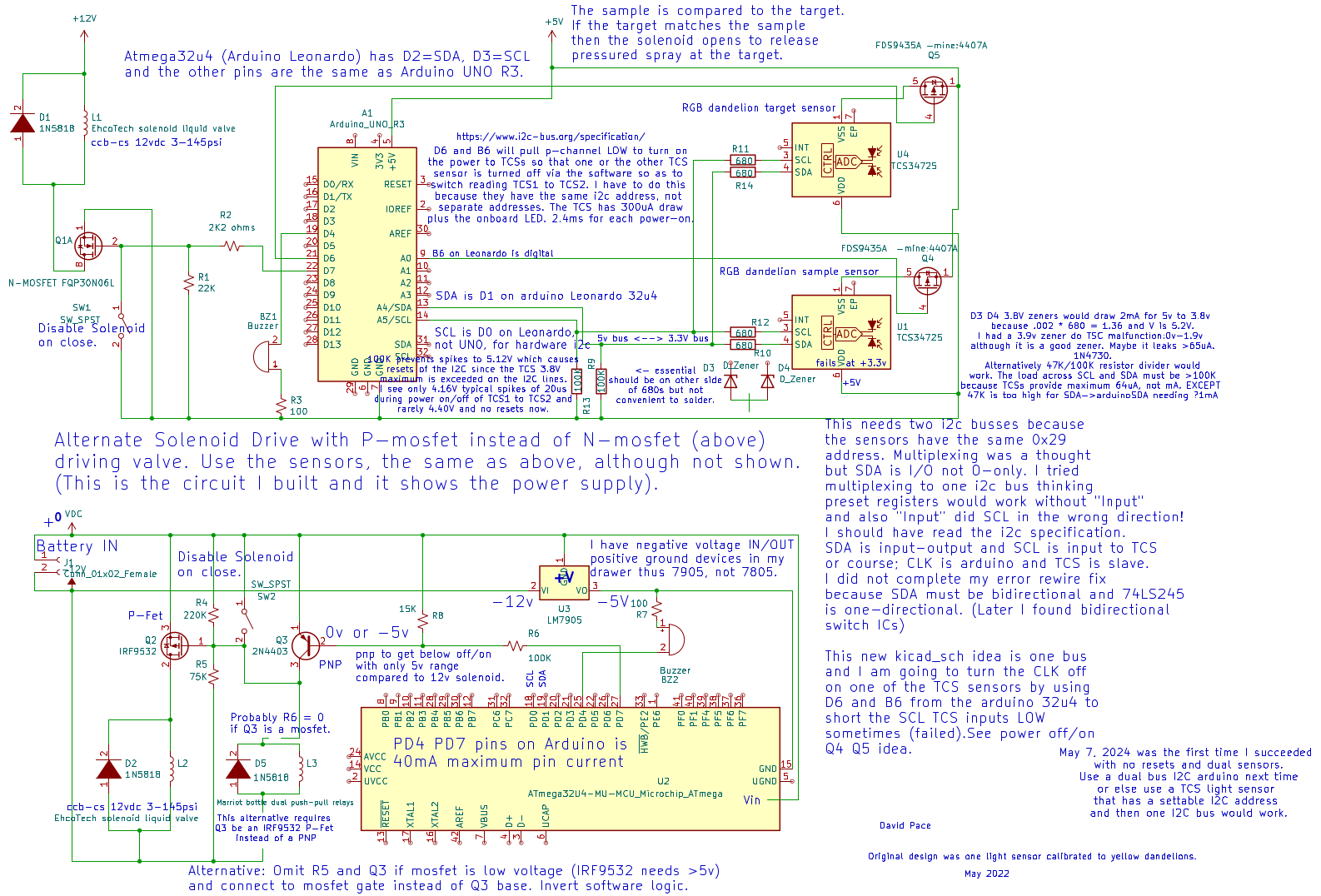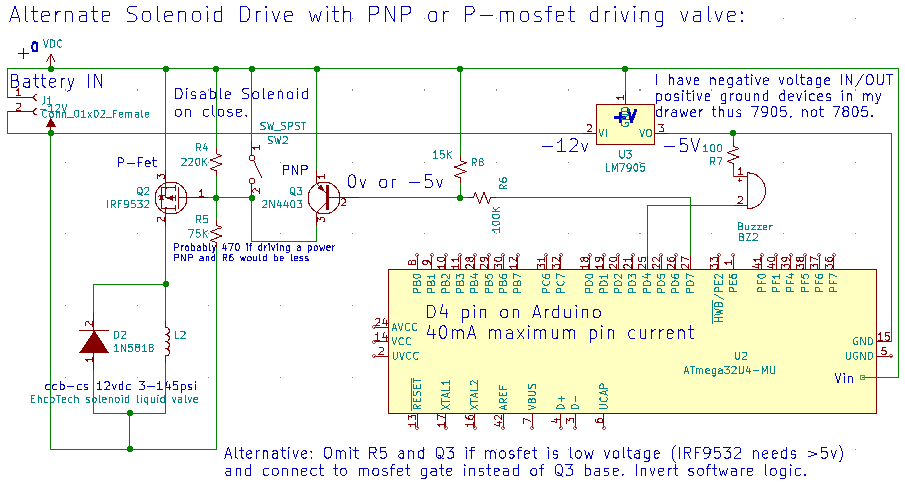Difference between revisions of "Dandelion Flower Weed Wand"
(link fix) |
m (more details about the I2C problem) |
||
| (9 intermediate revisions by the same user not shown) | |||
| Line 1: | Line 1: | ||
All my projects are located here: https://opencircuits.com/index.php?title=User:Definitionofis | All my projects are located here: https://opencircuits.com/index.php?title=User:Definitionofis | ||
| − | + | November 10, 2024: | |
| + | This is a dual light sensor schematic, which uses a new concept to calibrate the sensor to lighting conditions. | ||
| + | One sensor is control and the other is testing the sample. A newer microprocessor than Leonardo, 2012 | ||
| + | would not need to power off/on the two sensors, but would read them from an extra I2C bus on a more | ||
| + | capable microprocessor. Leonardo has one I2C bus. Alternatively, a light sensor with a settable address | ||
| + | would only need one I2C bus and would also avoid the off/on mosfet work-around. However my light sensors | ||
| + | had one fixed address. | ||
| + | |||
| + | I will release the microprocessor source code as open source after I decide what to do with this project. | ||
| + | |||
| + | [[File:WeedWandSchematicDualSensor.png]] | ||
| + | |||
| + | Spring of 2022: | ||
| + | The below circuit only worked for 30 minutes at dusk because the changes from sunny skies to cloud was impossible | ||
| + | to calibrate with the sensor which I used. I gave up without understanding why my colour mathematics was failing. | ||
| + | |||
| + | This is two years delayed because the light sensor misbehaves in outdoor light and only works reliably indoors. | ||
| + | |||
| + | I thought of a solution using two sensors to compare a target to a sample weed | ||
| + | instead of the trouble I am having with mathematically determining colours of weeds | ||
| + | (which frustratingly vary depending on brightness and quality of lighting). | ||
| + | |||
| + | Dual sensors would work because an indoor lit and outdoor lit target are compared to | ||
| + | a real sample indoor lit or outdoor lit sample rather than compared to a mathematical model of what is that weed colour. | ||
| + | Is it yellow? is no longer relevant. All that matters is: Is it the same relative to the sample weed under the same light condition as the target weed. | ||
| + | |||
| + | This circuit works, but the sensor is not distinguishing weeds from grass in outdoor light. | ||
| + | So I have not included the computer program to flash the Arduino, yet: | ||
| + | [[File:WeedWandSchematic1.png]] | ||
| + | |||
| + | This is the circuit only showing the alternate solenoid driver, which is a power supply plus P-channel mosfet instead of N-channel, above. Add the sensor from the previous schematic. | ||
| + | |||
| + | [[File:WeedWandSchematic2_alternateSolenoidDriverCircuit.png]] | ||
Latest revision as of 09:51, 10 November 2024
All my projects are located here: https://opencircuits.com/index.php?title=User:Definitionofis
November 10, 2024: This is a dual light sensor schematic, which uses a new concept to calibrate the sensor to lighting conditions. One sensor is control and the other is testing the sample. A newer microprocessor than Leonardo, 2012 would not need to power off/on the two sensors, but would read them from an extra I2C bus on a more capable microprocessor. Leonardo has one I2C bus. Alternatively, a light sensor with a settable address would only need one I2C bus and would also avoid the off/on mosfet work-around. However my light sensors had one fixed address.
I will release the microprocessor source code as open source after I decide what to do with this project.
Spring of 2022: The below circuit only worked for 30 minutes at dusk because the changes from sunny skies to cloud was impossible to calibrate with the sensor which I used. I gave up without understanding why my colour mathematics was failing.
This is two years delayed because the light sensor misbehaves in outdoor light and only works reliably indoors.
I thought of a solution using two sensors to compare a target to a sample weed instead of the trouble I am having with mathematically determining colours of weeds (which frustratingly vary depending on brightness and quality of lighting).
Dual sensors would work because an indoor lit and outdoor lit target are compared to a real sample indoor lit or outdoor lit sample rather than compared to a mathematical model of what is that weed colour. Is it yellow? is no longer relevant. All that matters is: Is it the same relative to the sample weed under the same light condition as the target weed.
This circuit works, but the sensor is not distinguishing weeds from grass in outdoor light.
So I have not included the computer program to flash the Arduino, yet:

This is the circuit only showing the alternate solenoid driver, which is a power supply plus P-channel mosfet instead of N-channel, above. Add the sensor from the previous schematic.

